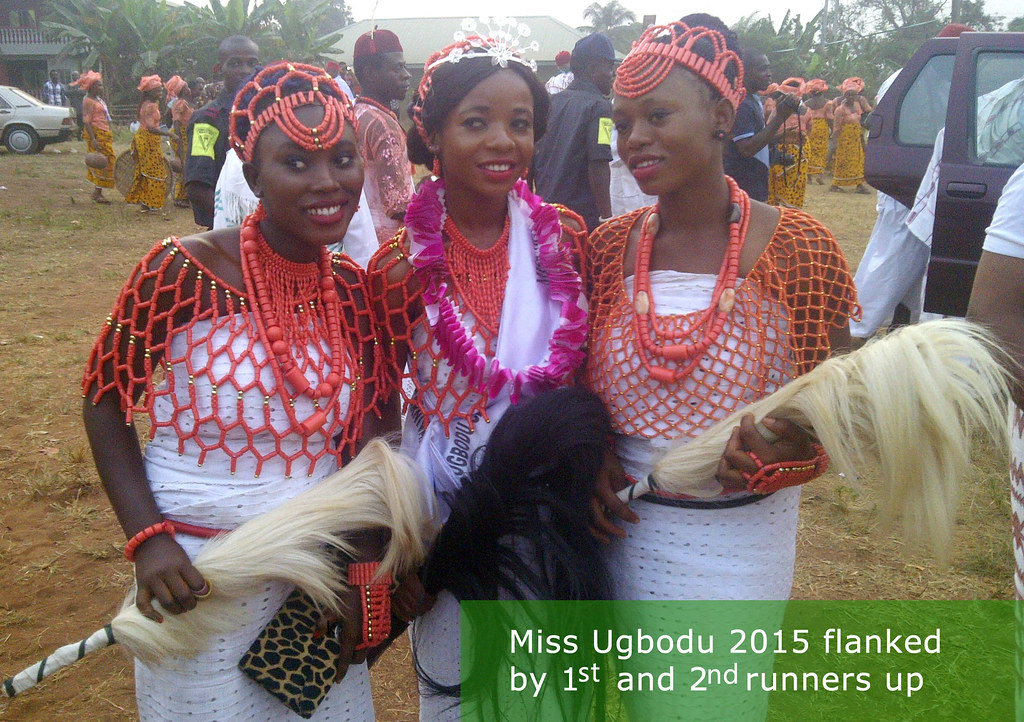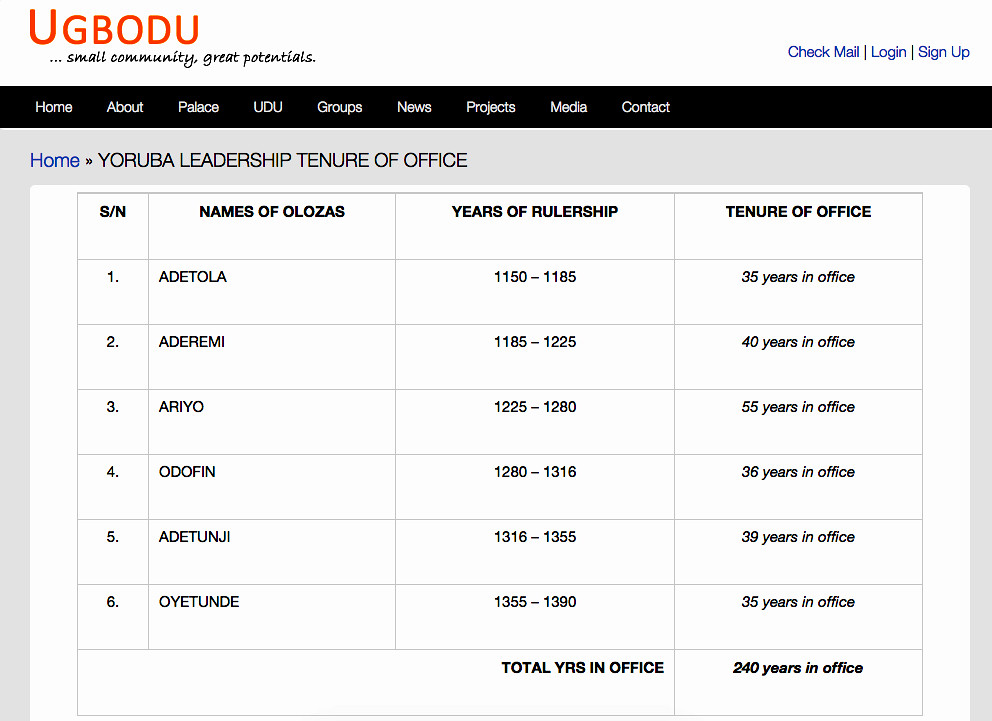Where Yoruba And Igbo Peoples Meet - Ugbodu, Delta State. - Culture (2) - Nairaland
Nairaland Forum / Nairaland / General / Culture / Where Yoruba And Igbo Peoples Meet - Ugbodu, Delta State. (29798 Views)
Why This Similarity Between Yoruba And Fulani? / The Defunct Benin Empire And Its Igbo Peoples. / Nigerian Traditonal Wedding: Hausa, Yoruba And Igbo (2) (3) (4)
(1) (2) (3) (4) (5) (6) (7) (Reply) (Go Down)
| Re: Where Yoruba And Igbo Peoples Meet - Ugbodu, Delta State. by scholes0(m): 8:18am On Jan 11, 2016 |
looool |
| Re: Where Yoruba And Igbo Peoples Meet - Ugbodu, Delta State. by lawani: 8:25am On Jan 11, 2016 |
Radoillo: Arochukwu's socio political organisation was like that of the Yoruba, not similar to Nri who lived in villages. The Eze Aro is like a Yoruba monarch, not like an Nri priest. I am not saying people from Ife Osun state made those bronze works but I believe the people who made those works are people affiliated with an ancient Ife. This year June 3 will be the beginning of 10060th year of the Ife calendar. When that era started and up to 5 thousand years after, there were no Yorubas or Igbos but Ife people. Ife was the political as well as the spiritual capital, other Yoruba states are Ife successors, that is never denied. Many have eclipsed Ife and that is normal but all still acknowledge Ife as origin. It is a bit different from the Eze Nri status. Ife is a state of its own with towns and villages and extracts no tribute from any of the successor states who are fully independent and separately run. The Ooni rules Ife and not any other Yoruba land. The Eze Nri does not rule anywhere. There is a kind of similarity though but yet they are different. One is a monarch and the other is not. |
| Re: Where Yoruba And Igbo Peoples Meet - Ugbodu, Delta State. by Nobody: 8:33am On Jan 11, 2016 |
I'm done, Lawani. It looks like we're about to begin the inevitable going-round-in-circles game. Just keep your series of ancient Ifes on your side of the Niger; they had nothing to do with us and our achievements. On the topic: A number of the Olozas had names beginning with 'Ade'. I read in one work by Biodun Adediran that 'Ade-' names did not become current among the Yoruba prior to about the 18th century. I don't know how true that statement is. |
| Re: Where Yoruba And Igbo Peoples Meet - Ugbodu, Delta State. by lawani: 9:15am On Jan 11, 2016 |
Radoillo: That is true, though Ade has always meant crown. It may mean the Olozas or Olojas of Ugbodumila were the first to start fixing Ade to names. I will make research to find out if there are any ancient Yoruba monarchs with an Ade name. I doubt it really. Aole, Abisipa, Sango and etc are names of Alaafins. The present one is Adeyemi the second. Sijuwade is a name containing Ade and it is the name of Olubuse the second, the late Ooni. Owa Obokuns are Atakunmosa, Bepo, Biladu, Aromolaran and etc, Aromolaran the second is on the throne and his personal name is Adekunle. It is remarkable that ancient monarchs did not use Ade as prefix to names. 2 Likes |
| Re: Where Yoruba And Igbo Peoples Meet - Ugbodu, Delta State. by bigfrancis21: 8:05pm On Jan 11, 2016 |
Radoillo: You look like some smart chap trying to lay claims to the sophisticated Igbo-ukwu artworks, said to be of superior making and finesse compared to any of its peers of its time and contemporary times. If only wishes could come true.  |
| Re: Where Yoruba And Igbo Peoples Meet - Ugbodu, Delta State. by Nobody: 8:49pm On Jan 11, 2016 |
bigfrancis21:   |
| Re: Where Yoruba And Igbo Peoples Meet - Ugbodu, Delta State. by Idiataqueen(f): 9:53pm On Jan 11, 2016 |
All these stupid history from google. |
| Re: Where Yoruba And Igbo Peoples Meet - Ugbodu, Delta State. by macof(m): 2:05pm On Jan 12, 2016 |
tonychristopher: Actually, unless a word contains "chi" or something absent from yoruba lexicon it sounds yoruba. they bear yoruba names actually. .. jst like Chidi and Chukwudi in different igbo dialects, Names like Mojere and Mozere, Omawunmi and Omowunmi are different dialects of the same language...even Oloza is Oloja they say Oma - like many yorubas do say Aze when western yorubas say Aje they say "se" like many yorubas while western yorubas say "she" their culture doesn't seem so different from what we have in Owo - their homeland 2 Likes |
| Re: Where Yoruba And Igbo Peoples Meet - Ugbodu, Delta State. by bigfrancis21: 2:35pm On Jan 12, 2016 |
macof: Actually, names with 'mo' in Igboland especially in Delta Igbo axis are very common and is often a short spelling of 'mmuo' meaning 'spirit'. Names like mokwunye, modebe, mozere (may the spirit intercede), enemmo etc. are quite common in Anioma. On the eastern flank, 'mmuo' bearing names in full are more common i.e. mmuodebe, enemmuo, ilommuo etc. 1 Like |
| Re: Where Yoruba And Igbo Peoples Meet - Ugbodu, Delta State. by bigfrancis21: 2:35pm On Jan 12, 2016 |
| Re: Where Yoruba And Igbo Peoples Meet - Ugbodu, Delta State. by lawani: 3:17pm On Jan 12, 2016 |
macof: Apart from all that Ugbodumila is clearly a Yoruba language understandable by any Yoruba speaking person. Ugbo- Forest, du mi- seize me or rescue me, la- saved or prospered. If I say Ade ati Akin n du aga it means Ade and Akin are dragging or contesting for a chair between them. Ugbodumila means the forest seized me or rescued me and I was saved. 1 Like |
| Re: Where Yoruba And Igbo Peoples Meet - Ugbodu, Delta State. by macof(m): 4:26pm On Jan 12, 2016 |
bigfrancis21: You fail to see the point. ur igbo Mozere doesn't mean anything like the Olukumi "Mozere". ..which means the same thing when rendered as "Mojere" in yoruba.. that is "I've been favored" even the name "Olukumi" means same in all yoruba dialects which includes Olukumi dialect... 1 Like |
| Re: Where Yoruba And Igbo Peoples Meet - Ugbodu, Delta State. by Nobody: 5:26pm On Jan 12, 2016 |
bigfrancis21: I'm alright. Aka m no Naija. |
| Re: Where Yoruba And Igbo Peoples Meet - Ugbodu, Delta State. by bigfrancis21: 5:54pm On Jan 12, 2016 |
macof: I just thought I'd point that out before the 'claim' goes on to other 'Mo-' Igbo names such as Modebe, Mokwunye etc. Mozere is not a common Igbo name, per say, and could be strictly Olukwumi but has an Igbo meaning if rendered differently. 1 Like |
| Re: Where Yoruba And Igbo Peoples Meet - Ugbodu, Delta State. by bigfrancis21: 5:55pm On Jan 12, 2016 |
Radoillo: Oh boy...I na-akunu...o dika I nwetego ofu ezigbo olu na Abuja maobu Lagos?  |
| Re: Where Yoruba And Igbo Peoples Meet - Ugbodu, Delta State. by Nobody: 9:06pm On Jan 12, 2016 |
| Re: Where Yoruba And Igbo Peoples Meet - Ugbodu, Delta State. by OfoIgbo: 12:25pm On Feb 07, 2016 |
lawani: Firstly, Nri consists of the four core towns of Enugwu-ukwu, Nawfia, Enugwu-Agidi and Agukwu section of Nri town. Oruora no longer exists. Basically every town or village of Nri ancestry must have a direct lineage to any of the above Nri towns. From irrefutable information at my disposal, tributes to Nri also came from ancient Benin Obas and Attahs of Igala. Igbo-Nkwo or more accurately Oraeri bronzeworks are all hundreds of years older than Ife artworks Igbo-Nkwo bronzeworks were discovered alongside a royal burial chamber of a seated ancient Eze Nri, as has remained the case till this day, and such sacred artworks would not have been crafted by proto Yorubas as you put it, as such holy relics would have needed properly suitable craftsmen who were loyal to the Nri worship system. You can totally rule out Ife craftsmen. In fact, Igala or Benin craftsmen were more likely and more qualified to produce such artworks than Ife people because both cultures were within the Nri sphere of influence Now I know Awka people produced IRON artefacts enmass, but I will have to study and enquire a little more, to find out whether Awka blacksmiths produced brass or bronzeworks 2 Likes |
| Re: Where Yoruba And Igbo Peoples Meet - Ugbodu, Delta State. by lawani: 8:52pm On Feb 07, 2016 |
The Igala did not use the lost wax method and the Benin has never denied that they learnt the art from Ife. So Ife is the owner of the style undoubtedly at least in the modern context that we can relate with but go back further like 5 thousand years ago. No distinction between Igbos and Yoruba. So it is all mixed up and it can not be denied that the Yoruba are the custodians of the history of those ancient ancestors. Nris have no history farther back than ten centuries ago or so. There were no state funded institutions to support the preservation of history. The Ifa corpus maybe the largest body of poetry in the world passed down meticulously over thousands of years. Without organisation that can't be possible, the creation of such bronze works will also be more impossible. Also, the Eze Nri did not take tribute. It would be wrong to suggest that. They got donations and never used force on anyone. The Eze Aro, Attah Igala, Oba of Benin and etc were the tribute takers in those areas in the past. Not the Eze Nri who was a priest. |
| Re: Where Yoruba And Igbo Peoples Meet - Ugbodu, Delta State. by bigfrancis21: 2:58pm On Feb 08, 2016 |
lawani: I find it surprising that you are won't to deliberately lay claims to the Igbo Ukwu artworks, known to the best of its peers in the entire southern region and Europe at its time and many centuries after, by mere 'thinking' of 'only Ife could have produced such artwork' with no solid proof whatsoever other than 'I think those artworks belong to the Ife' so as to claim something as mighty and polished as the Igbo Ukwu artworks. One would wonder why if Ife produced such artworks or taught other people, why the artworks produced in Ife itself are not as polished or half good as that of Igbo-Ukwu artworks. Yea, I understand your inclination to lay claims to the Igbo Ukwu artworks. In the figment of your imagination, Ife is the 'greatest' place on earth, 'capable' of producing such exceptional artworks. No other tribe in Nigeria is capable of building such. Truth be told, the Ife artworks cannot be compared to the more sophisticated Igbo Ukwu artworks, which baffled scientists as to how ancient Igbos could have built such sophisticated artworks, at least comparable to none in Europe at its time. While the Ife artworks are mostly heads, simple and few, the Igbo Ukwu artworks display much more artistry, sophistication and finesse. IFE [img]http://hum.lss.wisc.edu/hjdrewal/ife_new_jthu_pg.jpg[/img] [img]http://hum.lss.wisc.edu/hjdrewal/Ife4.jpg[/img] [img]http://hum.lss.wisc.edu/hjdrewal/Ife3.jpg[/img] [img]http://hum.lss.wisc.edu/hjdrewal/Ife5.jpg[/img] Meanwhile, IGBO-UKWU [img]http://2.bp..com/-gPGeSlbEPps/T1EABR-ZcRI/AAAAAAAAAKQ/zFoIfOyKPQM/s320/Igbo%2BUkwu.jpg[/img]   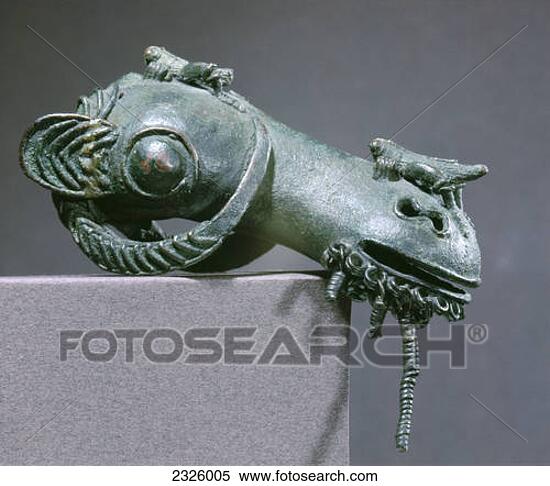  And much more. Yea, I see your inclination to want to lay claims to Igbo Ukwu artworks as yours. Mind you, just like the Egyptians, ancient Igbos also built pyramids, albeit smaller than the Egyptian pyramids. This is not recorded in history for the Yorubas. I find it funny how some people try to go back to rewrite history to put themselves in limelight even when there is no proof whatsoever. 8 Likes 1 Share |
| Re: Where Yoruba And Igbo Peoples Meet - Ugbodu, Delta State. by scholes0(m): 3:51pm On Feb 08, 2016 |
^^ lol, what kind of selective posting is that? if you want to talk about intricacy, this is also Ife art.   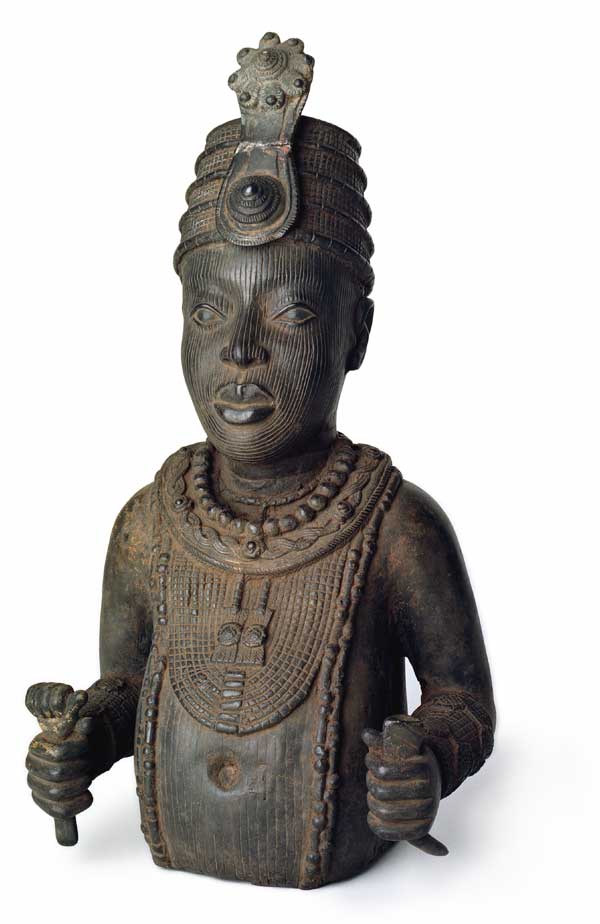 [img]http://2.bp..com/-QC1lZZoCv1Q/Um8HLV2IoXI/AAAAAAAAB2k/31XuLbeLRco/s1600/Screen+shot+2013-10-26+at+9.33.16+PM.png[/img]    Which in my Opinion are much finer. It is widely acknowledged that artwork produced by the Yoruba/Edo were one of the finest in all SSA. no arguments on this one Francis. Your works speak for you. 1 Like |
| Re: Where Yoruba And Igbo Peoples Meet - Ugbodu, Delta State. by bigfrancis21: 11:14pm On Feb 08, 2016 |
scholes0: @bold...first you admit that it is your opinion. Good job. Second, never has it been widely 'acknowledged' anywhere whatsoever as you claim. The Ife artworks are mostly head artworks, simple in nature and lacking any intriguing complexities. On the other hand, the Igbo Ukwu artworks were craft-fully and artfully made and carved and woven, to the very smallest degree of precision such as the representation of insects landing on the item being carved. According to Williams, Denis (1974). Icon and Image: A Study of Sacred and Secular Forms in African Classical Ar. Allen lane London. p. 211, Apparently the metal workers of ancient Igbo-Ukwu were not aware of commonly used techniques such as wire making, soldering or riveting which suggests an independent development and long isolation of their metal working tradition. From the above, the writer acknowledges that the Igbo Ukwu artworks were most likely a handwork of the ancient Igbos themselves, having developed independently of any outside influence. According to Garlake, Peter (2002). Early art and architecture of Africa. Oxford: Oxford University Press. p. 120., It is therefore perplexing that they were able to create objects with such fine surface detail that they depict, for example small insects which seem to have landed on the surface. Though these appear to have been riveted or soldered on to the artifacts, they were actually cast in one piece. The Grove Encyclopedia of Materials and Techniques in Art describes them as being "among the most inventive and technically accomplished bronzes ever made." Although the lost wax casting process was used to produce the bronzes, latex was probably used in Igbo-Ukwu instead of beeswax which would explain how the artists were able to produce such fine and filigrann surface detail. Some of the techniques used by the ancient smiths are not known to have been used outside Igbo-Ukwu such as the production of complex objects in stages with the different parts later fixed together by brazing or by casting linking sections to join them. [Here, another source corroborates the independent production of the Igbo Ukwu artworks by the Igbos themselves, not to some outside influence as Lawani would want to claim.] However the complexity of some of the Igbo-Ukwu objects has led to considerable altercation between various metallurgic experts and debates regarding the actual production process which is an affidavit for the highly developed and intricate work of the ancient artists. The composition of the metal alloys used in the production of the bronze is unique, with an unusually high silver content and is distinct from alloys used in Europe, the Mediterranean or other African bronze centers. The origin of the metal ore used to produce the bronze has been located to old mines in Abakiliki about 100 kilometers from Igbo-Ukwu. They are the oldest bronze artifacts known in West African and were manufactured centuries before the emergence of other known bronze producing centers such as those of Ife and Benin. (Source: Apley, Alice (October 2001). "Igbo–Ukwu (ca. 9th century)". Heilbrunn Timeline of Art History. Metropolitan Museum of Art. Retrieved December 15, 2014) The Igbo-Ukwu artifacts did away with the hitherto existing colonial era opinions in archaeological circles that such magnificent works of art and technical proficiency could only originate in areas with contact to Europe, or that they could not be crafted in an acephalous or egalitarian society such as that of the Igbo. Some of the glass and carnelian beads have been found to be produced in Old Cairo at the workshops of Fustat thus establishing that trade contacts did exist between Igbo-Ukwu and ancient Egypt. While Ife artworks were mostly head images, Igbo Ukwu artworks were diversified and included numerous ritual vessels, pendants, crowns, breastplates, staff ornaments, swords, and fly-whisk handles, indicating a more experienced and diversified expertise of the creators. Now compare those artworks that you've posted to much more finer works of the Igbo Ukwu displaying finesse and artful precision: A lost wax cast of a ram's head from Igbo-Ukwu, eastern Nigeria, 9th century  Beautiful art 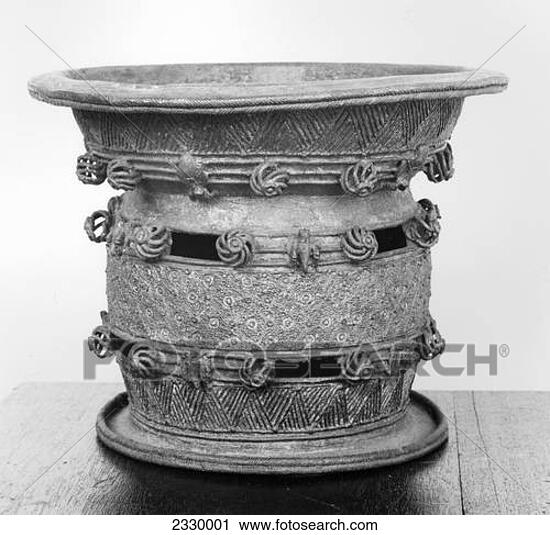 A bronze ceremonial wine bowl, Igbo Ukwu, Nigeria, 9th century 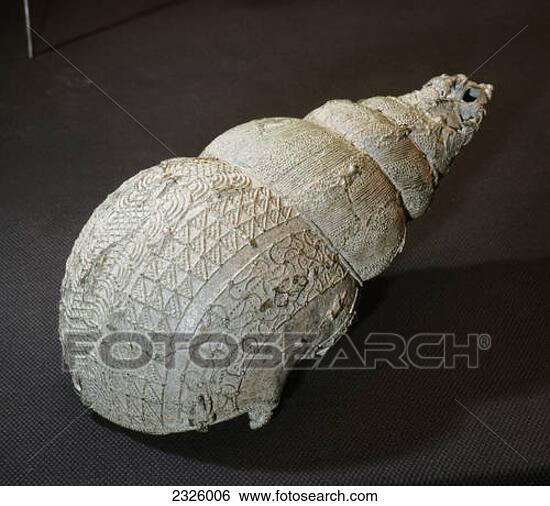 A lost wax cast vessel, Igbo-Ukwu, eastern Nigeria, 9th century 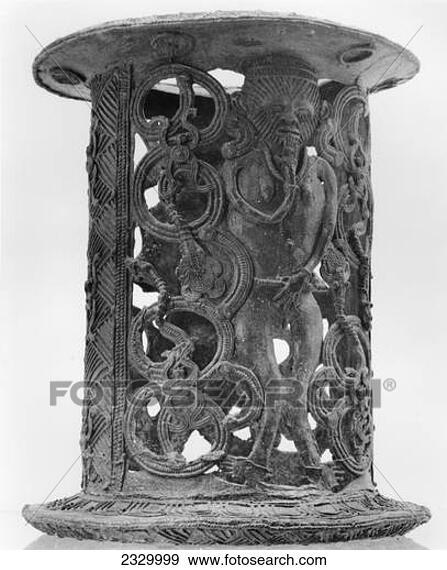 Bronze stand incorporating images of a warrior, Igbo Ukwu, Nigeria, 9th-10th century 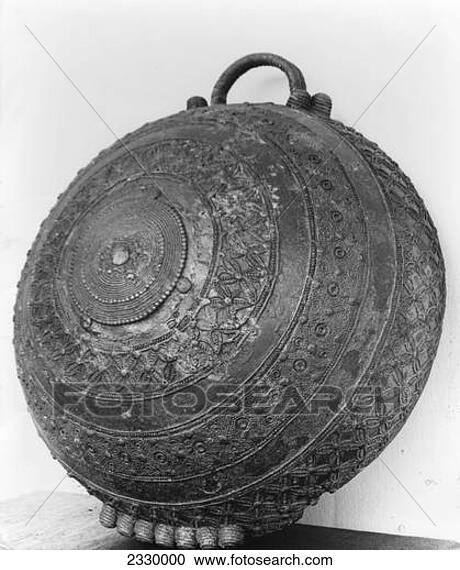 Bronze bowl cast by the 'lost wax' method, Igbo Ukwu, Nigeria, 9th century  Head of a priest   [img]http://pics.livejournal.com/cnsofo1/pic/0000ca7k/s640x480[/img] Aha! And just like you said, there is no argument on this one scholes0. 5 Likes 2 Shares |
| Re: Where Yoruba And Igbo Peoples Meet - Ugbodu, Delta State. by lawani: 4:55am On Feb 09, 2016 |
If bronze art cast with the lost wax method were found buried in Europe, it will be attributed to Ife. Not to talk of when found in nearby Ugbo Ukwu buried in the compound of subsistence farmers and villagers. If there was a certain ancient Ife in Anambra, then that might explain it. An Ife chief may also have gone on exile or was returning to a more ancient Ife with the bronze works then died on the way and etc. Those are what should be considered because the lost wax method is Ife property and there are definitely more bronzes scattered, buried all over the country yet to be discovered. If some are found in Kaduna in 50 years' time in the compound of subsistence farmers and villagers, it would still be attributable to Ife. |
| Re: Where Yoruba And Igbo Peoples Meet - Ugbodu, Delta State. by bigfrancis21: 4:35pm On Feb 09, 2016 |
lawani: Lol. Do you have any academic proof of this, albeit small whatsoever? Are you insinuating that the lost wax method is only unique to the Ife people?  I love your continued insistence to lay claims to Igbo Ukwu artworks even when you have no evidence whatsoever. Keep it up bro. 1 Like |
| Re: Where Yoruba And Igbo Peoples Meet - Ugbodu, Delta State. by lawani: 9:27pm On Feb 09, 2016 |
bigfrancis21:That method is used worldwide but the Ife bronzes made with that method are more intricate. Others are not as intricate and the bronzes are not a surprise to Ife or Benin people. That is the point. To the Yoruba, Ife has always existed and there is no way some people will be making such bronzes in Igbo Ukwu that Ife will not know about it. Infact they will be Ife people. No Nri city that has always been there, Nri is new. Ife may have changed locations severally but it has always been there from the beginning of time when the first civilized humans landed on Earth, so this is why the Igbo Ukwu bronze were made by Ife people. Only a highly organised nation with central authourity like Benin, Ife can make those works. The name even sounds exactly like Forest of death in Yoruba, then Yoruba and Igbo languages are cousins and there are people who were ancestors to both Igbos and Yoruba. I may be wrong though but that is how I feel about it. Ancient Ife people were not Yoruba. They are ancestors of all. They did not speak Yoruba, their language is lost but modern Yoruba are their linear successors just because they kept the history. |
| Re: Where Yoruba And Igbo Peoples Meet - Ugbodu, Delta State. by bigfrancis21: 10:58pm On Feb 09, 2016 |
lawani: There's nothing intricate about Ife artworks. They are simple in nature and mostly head works, indicating a specialized artistry of Ife metal workers in producing just heads only. On the other hand, the Igbo-ukwu creators were more diversified in their skill producing a wide arrays of art works. By mere reasoning of this fact alone, Ife could not have attempted nor created Igbo-ukwu artworks in anyway when they could nearly not replicate the same in their home turf. It is the same as the US claiming they 'own' the cocoa production in Nigeria because they are a world power when they barely produce cocoa. You have every right to feel the way you do. It is your right. Nobody is going to take that from you. But objectivity becomes important when discussing history and ancestral connections. 1 Like |
| Re: Where Yoruba And Igbo Peoples Meet - Ugbodu, Delta State. by lawani: 5:02pm On Feb 10, 2016 |
bigfrancis21: The long and short of it is that finding something buried in Anambra does not mean it was made by Nri Igbos. Even the remains of a man of European origin was found in the Americas and it predates Columbus by I think over a thousand years. So finding something somewhere is not conclusive on its origin. Take Lokoja town for instance, just in the 18th to early 19th century, it was an Oyo Yoruba town for slave dealing. Nowadays, it no longer has that identity. So if artefacts are unearthed there in the compound of some Igbo villagers in 2000 years' time, the Nri Igbos will lay claim to that artefacts as made by their ancestors? I hope you see my point. 1 Like |
| Re: Where Yoruba And Igbo Peoples Meet - Ugbodu, Delta State. by bigfrancis21: 6:22pm On Feb 10, 2016 |
lawani: The same way one can argue that the artifacts found at Ife may not have been built by the Ife people but by some external form of civilization. By your logic, there is no proof the Ife constructed those artworks. Just because they were found in Ife doesn't mean they belong to Ife. These examples you gave are possibilities but in this case they do not apply. And like you said before, this is your opinion or just how you feel. Nobody is going to take that from you. However, standard scientific knowledge has been clearly stated out regarding the origin and date of the Igbo Ukwu artworks. Like I said before, it would be laughable for the Ife to claim Igbo Ukwu artworks when they cannot or did not replicate the same in their own territory. What evidence then do you have that the artworks were made by the Ife people, other than just 'I want to believe that Ife did'? Moreover, almost nearly nothing connects ancient Igbo and Yoruba ancient history whatsoever. The sudden clamour for Igbo-Ukwu arts by some Yorubas is quite laughable indeed. To the best of my knowledge, the Nri have not laid any claims to any artifacts from other Igbo areas asides the one clearly known to belong to Nri. I am not sure where this is coming from. 1 Like 2 Shares |
| Re: Where Yoruba And Igbo Peoples Meet - Ugbodu, Delta State. by lawani: 4:04am On Feb 11, 2016 |
bigfrancis21:Would you say the Benin bronze made in Benin but learnt from Ife were not made in Benin then? And we know Benin was a big city and Ife was a big city. Both were capitals of empires but Nri was nothing of that sort. Infact Benin is Ife too because the real name is Ife Ibinu. I hope you see why I believe the Igbo Ukwu bronze were made by an Ife people. |
| Re: Where Yoruba And Igbo Peoples Meet - Ugbodu, Delta State. by Konquest: 2:59am On Mar 23, 2018 |
scholes0:^^^^^^ ^^^^^^ Beautiful history... Cc: Olu317 1 Like 1 Share
|
| Re: Where Yoruba And Igbo Peoples Meet - Ugbodu, Delta State. by Konquest: 4:03am On Mar 23, 2018 |
Map of the Olukumi area in Aniocha North LGA. Near the Edo/Delta State borders. Exotic history... 3 Likes 1 Share
|
| Re: Where Yoruba And Igbo Peoples Meet - Ugbodu, Delta State. by Olu317(m): 7:56pm On Mar 26, 2018 |
Konquest:I have read a lot about even their significant impact in Cuba ,where they were rebellious against the white oppressions . These people were among the subset clan of Yoruba that made IFA worship and orisas such as ogun,sango, Obatala knowledge became known in their new found territory. And I find it hysterical when few people of Ibo ethnic group on NL try so much to forcefully coerce a group that refused to throw away their language that has survived over 500 years in an area that's outside their homogeneous relatives environment . Education and Yoruba language being taught is needed in this distant environ so that the Yoruba language will continually survive. This is the needed awereness that must continue to sensitize Yorubas, wherever location they find themselves, never to forget their Original homeland before emigration. 2 Likes |
| Re: Where Yoruba And Igbo Peoples Meet - Ugbodu, Delta State. by bigfrancis21: 1:59am On Mar 28, 2018 |
Olu317: Lol. Olukwumis have been present in Delta Igbo land for over 500 years? Not true. Their settlement in the area is quite recent - about 200 to 300 years or 4 to 5 generations ago, which explains why the language sort of survived till now. Second, since the Olukwumis still remember where exactly in Ondo state they came from, they are always free to return to their ancestral land. No Igbo, be it on NL or in real life, has tried to 'force' them to be anything they aren't. If for nothing, we gave them space and succor when they fled their original hometown and landed in our area as refugees, and they should be grateful for that for letting them in when they needed safety the most. Over time, natural adaptation took its course and most of them became Igbonized and switched to Igbo language, name and culture. However, given the option to return to their ancestral Ondo state, I doubt if most would want to, except the fanatical minority who are deeply interested in that. Over 70% of these people are deeply as Igbo as any south-easterner in language, culture and names. Every single one of them speaks Igbo as first language or maybe some speak it as second language and a much lesser percentage (especially the elderly) are bilingual in Olukwumi or an Olukwumi-Igbo mix as well. As for suddenly giving up Igbo and speaking Olukwumi only I doubt if this is feasible because Igbo language is what connects them to the greater Anioma Igbo and deciding to let go of the language would not benefit them in any way, alienate them from the greater Anioma fold and remind them of their 'immigrant' status in Delta state. 3 Likes 2 Shares |
(1) (2) (3) (4) (5) (6) (7) (Reply)
Oba Solomon Omisakin Is Dead / Africans/ Deodorant / Igbos, Will You Marry An Osu?
(Go Up)
| Sections: politics (1) business autos (1) jobs (1) career education (1) romance computers phones travel sports fashion health religion celebs tv-movies music-radio literature webmasters programming techmarket Links: (1) (2) (3) (4) (5) (6) (7) (8) (9) (10) Nairaland - Copyright © 2005 - 2024 Oluwaseun Osewa. All rights reserved. See How To Advertise. 145 |
